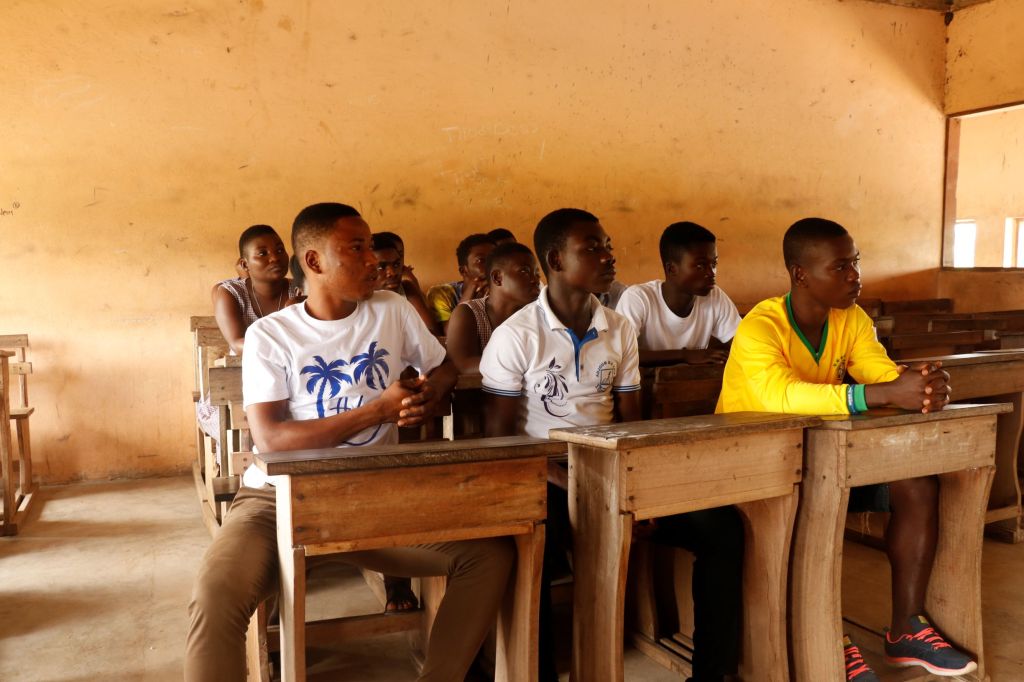
Photo by: Andrews Lartey CC BY-SA 4.0
Earlier this year, the Education Team at the Wikimedia Foundation issued a call–tell us how you want to use Wikimedia projects to promote education in your local community, and we’ll help you do it. 15 teams bravely stepped forward with ideas ranging from improving students digital skills in Bangladesh to engaging students to help close language gaps in Uganda. We selected one successful project to fully support both with mentorship, on-site help, and some seed funding1: The Technology and Green Mentorship program in Ghana, now known as Growing Open and Eco-friendly Skills for Youth in Ghana (GOES). We call this initiative the Wikimedia & Education Greenhouse, where the Education Team at the Wikimedia Foundation helps innovative ideas grow into high impact projects.
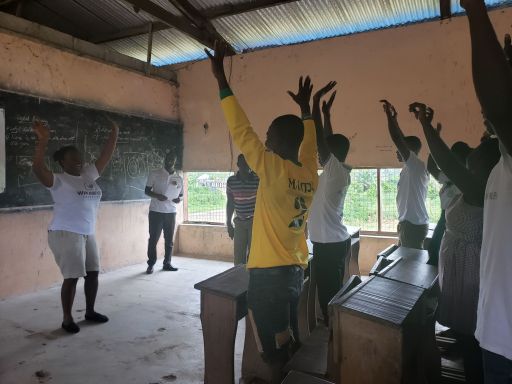
Photo by: Andrews Lartey CC BY-SA 4.0
The world is young. According to the World Bank, 42 percent of people are under the age of 25.2 Youth are a vulnerable and marginalized demographic. One in five children, adolescents and youth are out of school.3 High levels of youth unemployment have contributed to rising levels of rebellion and extremism.4/5 In Ghana, this is even more pronounced. The economy is growing, but joblessness among youth is also increasing. According to the African Center for Economic Transformation (ACET), “Young people tend to have higher rates of unemployment and to engage in vulnerable and informal employment….They enter the job market with different levels of education and with limited or no work experience, which tends to impede their chances of securing productive and/or formal sector jobs.”6
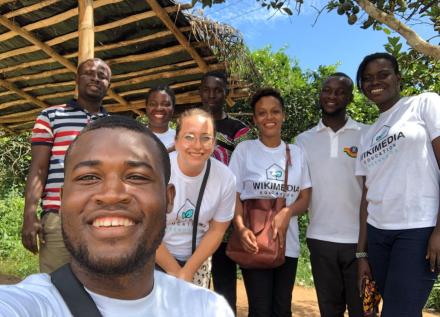
Photo by: Andrews Lartey CC BY-SA 4.0
One group of Wikimedians in Ghana saw an opportunity to make an impact on youth, and submitted their idea for the Wikimedia & Education Greenhouse. The group saw the potential of Wikimedia projects not only to tackle the problem of youth skills development, but also sustainability, nutrition, and community development. The selection committee was impressed by the innovative approach, and decided that this was the right project for the first edition of the Wikimedia & Education Greenhouse.
Andrews Lartey, Benedicta Nartey, Elizabeth Patterson and Joy Agyepong make up the founding members of the first Greenhouse Team. Over five days in early October, the team and I worked together to develop the project’s logic, understand the stakeholders and necessary partners, think through resourcing needs, and develop an evaluation plan that will help demonstrate the full impact of the project. After this initial visit, the team added the Communications and Community Engagements person of Open Foundation West Africa (OFWA) Ruby Danquah, and community volunteer Pamela Ofori-Boateng – GOES Communications person.
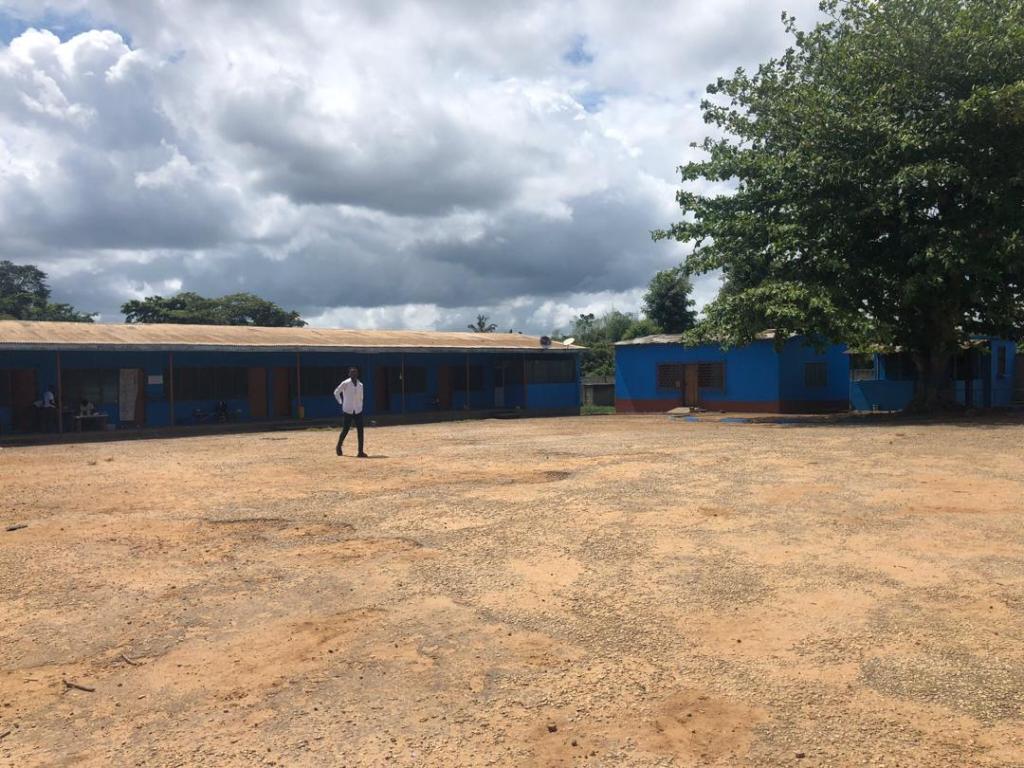
Photo by: Andrews Lartey CC BY-SA 4.0
The team knew they wanted to utilize the potential of the circular economy to help students build skills that will assist them to either gain employment, create new ventures or further their education. The circular economy is a growing area where job growth is inevitable. In 2015, the World Economic Forum published that, “Semi-skilled and highly skilled people are needed to support the circular economy and this is where opportunities may be generated for the young unemployed…” What’s more, the team knew that circular economy concepts were underrepresented in Wiki projects, especially in local languages. They settled on a project that works with partner organizations like Agromindset and School Farms to teach students about the circular economy concepts, have them use what they learn to build a school farm that enables the school to provide sustainable and nutritious meals, and have students document everything on Wiki projects in local languages so that the community can understand and replicate what they do. They dubbed the project “Growing Open and Eco-friendly Skills for Youth in Ghana” or GOES for Ghana.
The team will work with Heritage Academy – Ajumako, in the Central Region of Ghana, supporting 30+ students and teachers. The school’s founders, Kwesi Koomson and Melissa Schoerke Koomson, have generously agreed to set aside land for the school garden and to facilitate the participation of the students and teachers.
The success of this project will demonstrate the power of free knowledge to help students build skills that connect to job opportunities while at the same time closing knowledge gaps and contributing to the sustainable development of a community. The Education Team is so excited to be supporting this amazing initiative.
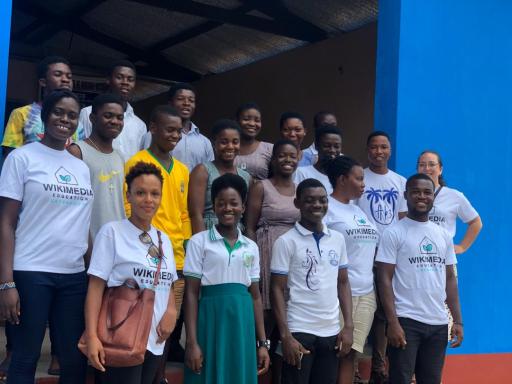
Photo by: Andrews Lartey CC BY-SA 4.0
Are you inspired to use Wikimedia projects to make a difference in education in your own community? Learn more at Education.wikimedia.org or join a discussion on Wikimedia Space.
Footnotes:
1. We are supporting the other projects through the Wikimedia & Education Online Course
2. Khokhar, T. (2017, April 17). Chart: How Is the World’s Youth Population Changing? Retrieved from http://blogs.worldbank.org/opendata/chart-how-worlds-youth-population-changing
3. Education Data Release: One in Every Five Children, Adolescents and Youth is Out of School. (2018, March 22). Retrieved from http://uis.unesco.org/en/news/education-data-release-one-every-five-children-adolescents-and-youth-out-school
4. Youth unemployment in the Arab world is a major cause for rebellion. (2011, April 05). Retrieved from https://www.ilo.org/global/about-the-ilo/newsroom/features/WCMS_154078/lang–en/index.htm
5. Bhatia, K., & Ghanem, H. (n.d.). How do education and unemployment affect support for violent extremism? Evidence from eight Arab countries(Rep.). Retrieved April 11, 2019, from Brookings website: https://www.brookings.edu/wp-content/uploads/2017/03/global_20170322_violent-extremism.pdf
6. William Baah-Boateng. (2018, Feb 27) Jobless growth is Ghana’s biggest youth challenge. Retrieved from http://acetforafrica.org/highlights/jobless-growth-is-ghanas-biggest-youth-challenge/

Can you help us translate this article?
In order for this article to reach as many people as possible we would like your help. Can you translate this article to get the message out?
Start translation